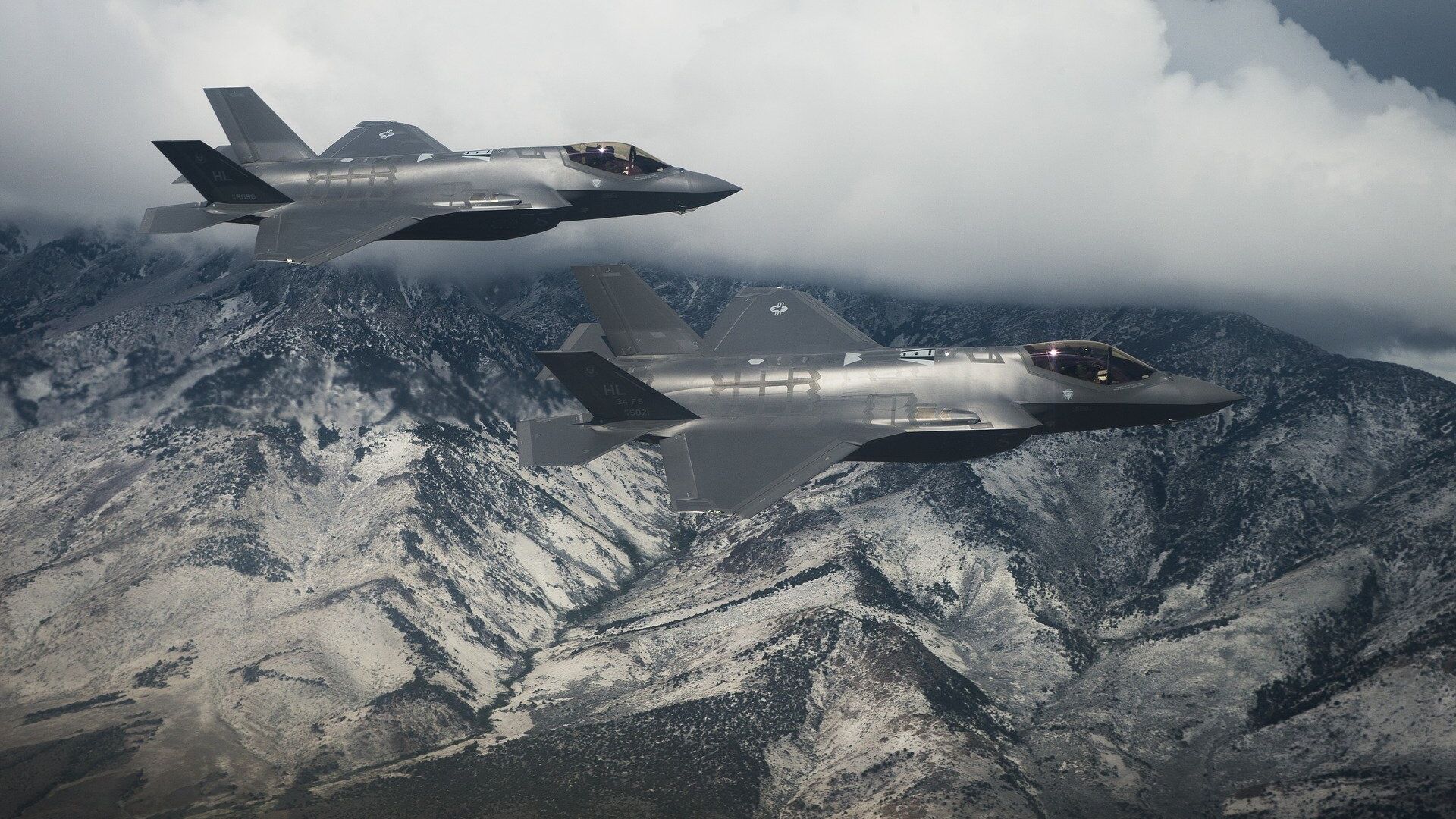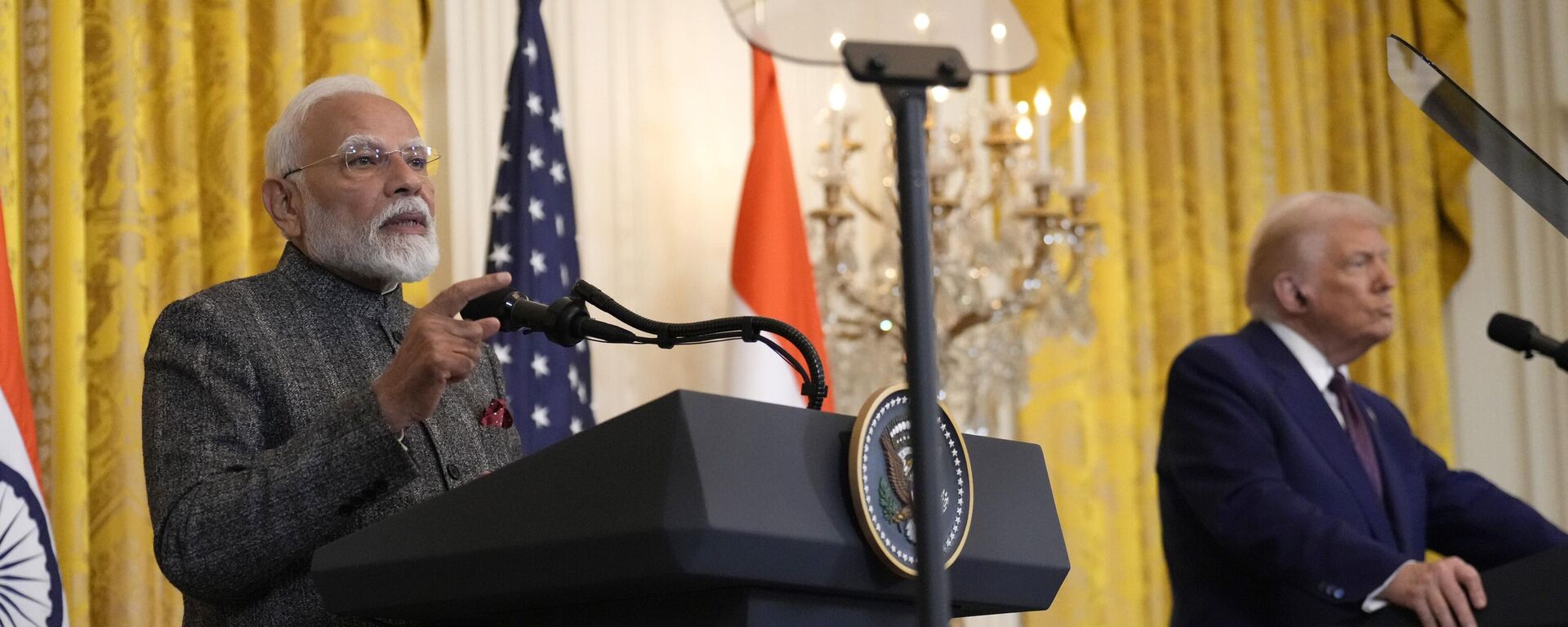https://sputniknews.in/20250801/is-india-getting-back-at-us-with-rejection-of-f-35-fighter-jets-9531331.html
Is India Getting Back at US With Rejection of F-35 Fighter Jets?
Is India Getting Back at US With Rejection of F-35 Fighter Jets?
Sputnik India
Tensions between India and the US have been simmering for months, with a range of top American officials, including President Donald Trump, issuing threats to... 01.08.2025, Sputnik India
2025-08-01T19:56+0530
2025-08-01T19:56+0530
2025-08-01T19:56+0530
sputnik opinion
donald trump
india
us
russia
indian air force (iaf)
pentagon
s-400 air defense systems
ak-203
brahmos supersonic cruise missile
https://cdn1.img.sputniknews.in/img/07e9/07/09/9421944_0:168:1920:1248_1920x0_80_0_0_cbde032172df2333d74ad343df9f3160.jpg
India has made it official that it is not interested in America's offer of acquiring the F-35 stealth fighter, confirming that no discussions over the sale of the fifth-generation aircraft have taken place between the two sides.Interestingly, the development came in the wake of the US administration imposing 25% tariffs on exports from India, with Trump announcing additional penalties if the South Asian state continued to purchase energy products and defence equipment from Russia.For months, India has withstood American pressure, underlining that Russian oil purchases were vital for its energy security. However, the current administration in the US has launched an all-out assault on India, with the top leadership, including Trump, Secretary of State Marco Rubio and Treasury Secretary Scott Bessent, all criticising India for not severing its close ties with Russia.Despite India's criticism from all quarters in America for its close association with Russia, Moscow could perhaps be the main reason behind India's move, states retired Group Captain Uttam Kumar Devnath.India's rejection of American fifth-generation F-35 fighter jets could be potentially due to Russia's lucrative terms that are on offer for the Su-57 stealth aircraft. Unlike the US, which is unwilling to transfer technology linked to its F-35s, Russia has already sweetened the deal for India, he added.Moreover, India's reluctance to go for the F-35s is the abundance of conditionalities linked with its sales to foreign countries. For instance, a major US demand has been that India forego its Russian-origin S-400 air defence systems because these platforms could compromise the security features of the F-35s. For the unversed, the S-400 is capable of intercepting and neutralising stealth aircraft, the former Indian Air Force (IAF) pilot explained.Besides, just a few months ago, the IAF said that its radars detected an F-35 in its airspace, raising serious questions about its stealth, he underlined.Similarly, India has maintained close relations with Russia, which has a history of its own. Following India's independence, the erstwhile Soviet Union provided all kinds of assistance to the newly formed nation, while the US sided with Pakistan, its arch-enemy, the military commentator highlighted.Even today, Trump has been courting Islamabad, something that is raising eyebrows in Delhi. More so, the Pentagon has been quite generous when offering weapons to Pakistan despite its dismal record on nuclear proliferation and terrorism, he pointed out.In contrast, India and Russia have always been equal partners and the latter has been pretty open and vocal about aiding the former in its pursuit of becoming self-reliant, particularly as a manufacturer of military equipment, the defence pundit observed.BrahMos Missile, AK-203 assault rifles, India's nuclear-powered ballistic missile submarines, warships, and so many other weapons platforms wouldn't have been possible without Russian help. That's why India will not fall into a trap laid by the US, he underscored.Meanwhile, Raj Kumar Sharma, a senior research fellow at Indian think tank NatStrat, believes India's F-35 move is in accordance with the needs of its defence forces and to boost the Make in India initiative in defence and not to get back at the Trump administration.India's strategic autonomy has always been problematic for the US, while America's hegemonic ambitions have created concerns in New Delhi, the observer mentioned.Now, the Trump administration may be working on its plan to target countries that trade with Russia. It also wants to weaken the BRICS. India is closely following these developments and relevant policy changes could come up in coming days, he concluded.
https://sputniknews.in/20250801/indias-strong-ties-with-russia-and-brics-should-not-yield-to-us-pressure-bjp-politician-9528934.html
india
us
russia
moscow
delhi
new delhi
washington d.c.
Sputnik India
feedback.hindi@sputniknews.com
+74956456601
MIA „Rossiya Segodnya“
2025
Pawan Atri
https://cdn1.img.sputniknews.in/img/07e6/0c/13/139630_147:0:831:684_100x100_80_0_0_8fa2b25903e7787fe6a2698552c167df.png
Pawan Atri
https://cdn1.img.sputniknews.in/img/07e6/0c/13/139630_147:0:831:684_100x100_80_0_0_8fa2b25903e7787fe6a2698552c167df.png
News
en_IN
Sputnik India
feedback.hindi@sputniknews.com
+74956456601
MIA „Rossiya Segodnya“
Sputnik India
feedback.hindi@sputniknews.com
+74956456601
MIA „Rossiya Segodnya“
Pawan Atri
https://cdn1.img.sputniknews.in/img/07e6/0c/13/139630_147:0:831:684_100x100_80_0_0_8fa2b25903e7787fe6a2698552c167df.png
donald trump, india, us, russia, indian air force (iaf), pentagon, s-400 air defense systems, ak-203, brahmos supersonic cruise missile, missiles, nuclear submarine, nuclear-powered attack submarine, f-35 fighter aircraft, su-57 fighter, su-57e, moscow, delhi, new delhi, washington d.c., marco rubio, brics
donald trump, india, us, russia, indian air force (iaf), pentagon, s-400 air defense systems, ak-203, brahmos supersonic cruise missile, missiles, nuclear submarine, nuclear-powered attack submarine, f-35 fighter aircraft, su-57 fighter, su-57e, moscow, delhi, new delhi, washington d.c., marco rubio, brics
Is India Getting Back at US With Rejection of F-35 Fighter Jets?
Tensions between India and the US have been simmering for months, with a range of top American officials, including President Donald Trump, issuing threats to destroy the former's economy by levying severe tariffs.
India has made it official that it is not interested in America's offer of acquiring the F-35 stealth fighter, confirming that no discussions over the sale of the fifth-generation aircraft have taken place between the two sides.
"No formal discussions have been held as yet on this issue," Minister of State for External Affairs Kirti Vardhan Singh said in a written reply to the Lok Sabha, the lower house of the Indian Parliament, on Friday.
Interestingly, the development came in the wake of the US administration imposing 25% tariffs on exports from India, with Trump announcing additional penalties if the South Asian state continued to purchase energy products and defence equipment from Russia.
For months, India has withstood American pressure, underlining that Russian oil purchases were vital for its energy security. However, the current administration in the US has launched an all-out assault on India, with the top leadership, including Trump, Secretary of State
Marco Rubio and Treasury Secretary
Scott Bessent, all criticising India for not
severing its close ties with Russia.
Despite India's criticism from all quarters in America for its close association with Russia, Moscow could perhaps be the main reason behind India's move, states retired Group Captain Uttam Kumar Devnath.
India's rejection of American fifth-generation F-35 fighter jets could be potentially due to Russia's lucrative terms that are on offer for the Su-57 stealth aircraft. Unlike the US, which is unwilling to transfer technology linked to its F-35s, Russia has already sweetened the deal for India, he added.
"Not only has the Eurasian country volunteered to co-produce the Su-57s in India, but it has publicly stated that a complete transfer of technology components will be included in the contract. To top it all, Russia has offered to share the source code of these combat planes, something no nation has done in the past while exporting a warplane to another foreign power," Devnath told Sputnik India.
Moreover, India's reluctance to go for the F-35s is the abundance of conditionalities linked with its sales to foreign countries. For instance, a major US demand has been that India forego its Russian-origin S-400 air defence systems because these platforms could compromise the security features of the F-35s.
For the unversed, the S-400 is capable of intercepting and neutralising stealth aircraft, the former Indian Air Force (IAF) pilot explained.
Besides, just a few months ago, the IAF said that its radars detected an F-35 in its airspace, raising serious
questions about its stealth, he underlined.
"The US has failed to understand that India is not keen to become a part of a military alliance led by Washington. While India is a member of the QUAD, as far as it is concerned, it is not a military alliance, rather a strategic group," Devnath stressed.
Similarly, India has maintained close relations with Russia, which has a history of its own. Following India's independence, the erstwhile Soviet Union provided all kinds of assistance to the newly formed nation, while the US sided with Pakistan, its arch-enemy, the military commentator highlighted.
Even today, Trump has been courting Islamabad, something that is raising eyebrows in Delhi. More so, the Pentagon has been quite
generous when offering weapons to Pakistan despite its dismal record on nuclear proliferation and terrorism, he pointed out.
"All these factors play a role in India conserving its strategic autonomy because it realises that it can't trust the US during moments of crisis. One must note that the US never treats India as an equal and instead, it will make it subservient to its interests," Devnath emphasised.
In contrast, India and Russia have always been equal partners and the latter has been pretty open and vocal about aiding the former in its pursuit of becoming self-reliant, particularly as a manufacturer of military equipment, the defence pundit observed.
BrahMos Missile, AK-203 assault rifles, India's nuclear-powered ballistic missile submarines, warships, and so many other weapons platforms wouldn't
have been possible without Russian help. That's why India will not fall into a trap laid by the US, he underscored.
Meanwhile, Raj Kumar Sharma, a senior research fellow at Indian think tank NatStrat, believes India's F-35 move is in accordance with the needs of its defence forces and to boost the Make in India initiative in defence and not to get back at the Trump administration.
"The decision may have been already conveyed to the US by the Indian government. However, it is not part of India's retaliation against the Trump administration. India would like to avoid external dependence in case of such sensitive military hardware," Sharma said in an interview with Sputnik India.
India's strategic autonomy has always been problematic for the US, while America's hegemonic ambitions
have created concerns in New Delhi, the observer mentioned.
Now, the Trump administration may be working on its plan to target countries that trade with Russia. It also wants to weaken the BRICS. India is closely following these developments and relevant policy changes could come up in coming days, he concluded.



